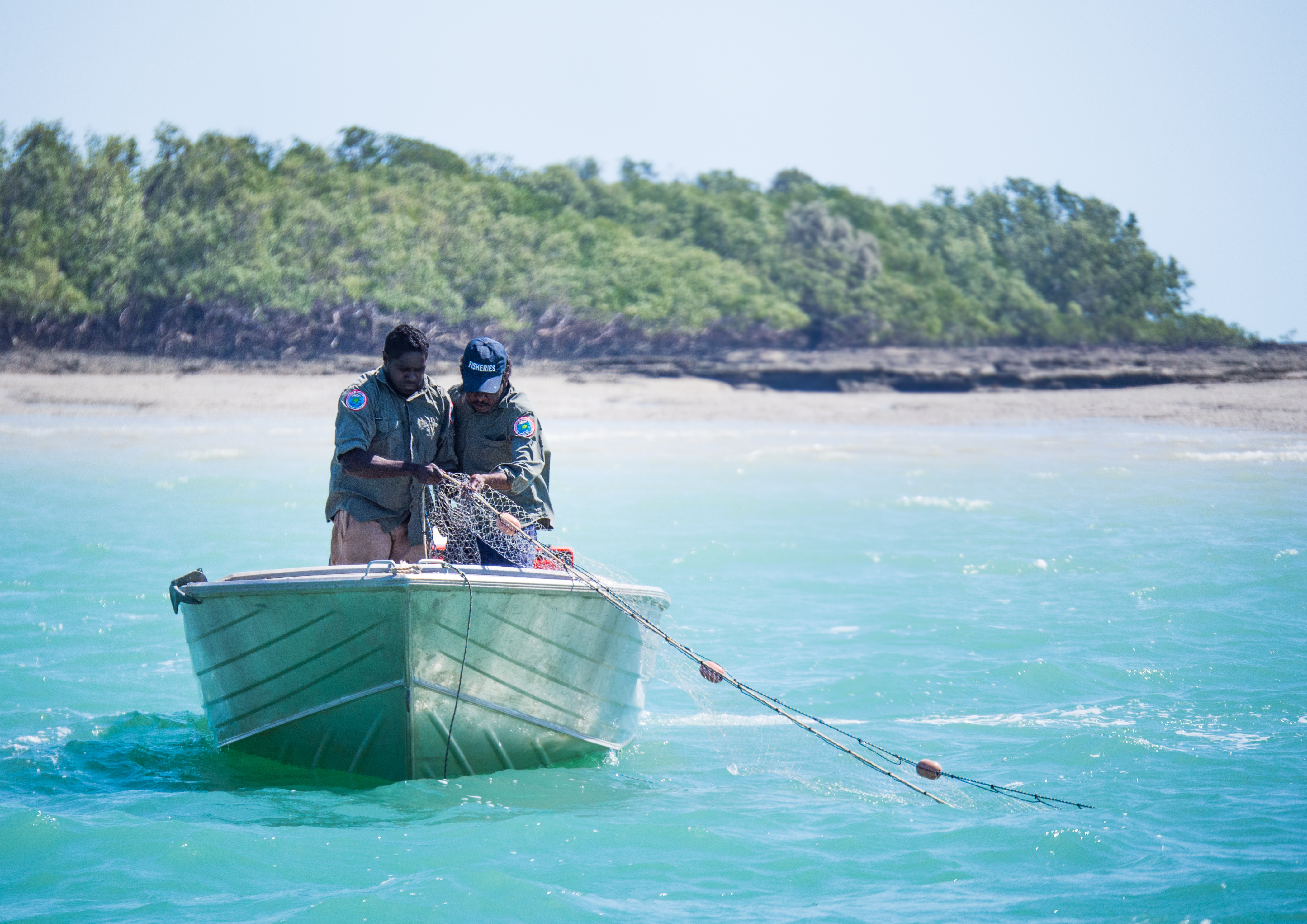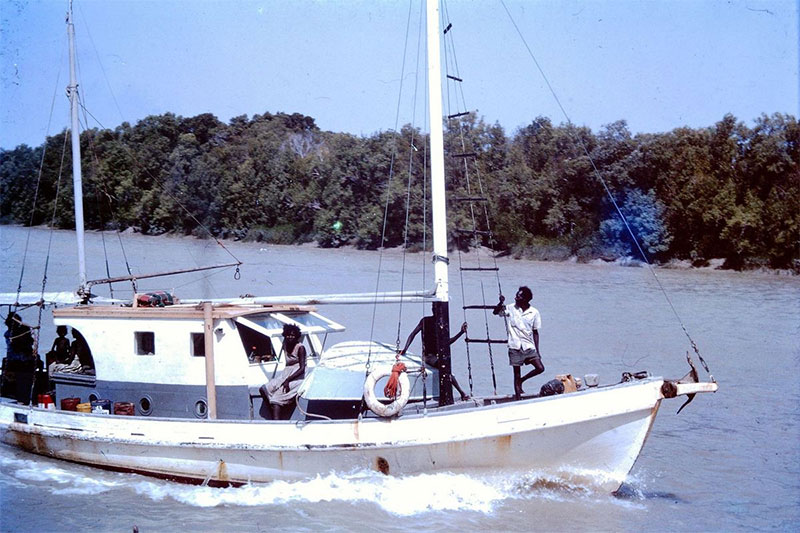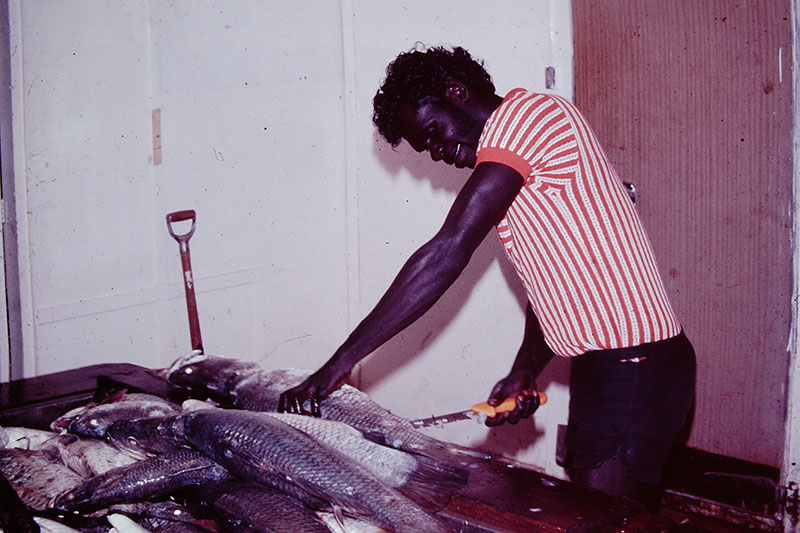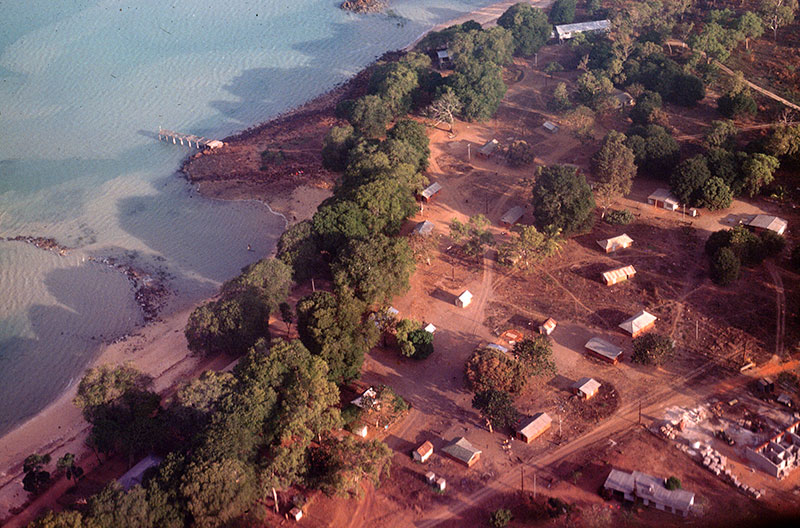
The Crocodile Islands Rangers (NT) manage and protect 80,000 hectares of land and 740,000 hectares of sea country, which includes 200 kilometres of coastline.
The Crocodile Islands Rangers (NT) manage and protect 80,000 hectares of land and 740,000 hectares of sea country, which includes 200 kilometres of coastline.
The Crocodile Islands are an archipelago off the coast of northeast Arnhem Land, home to the Yan-nhaŋu and other peoples of the wider Yolŋu nation.
The main island is Yurruwi, where the major community of Milingimbi is located. Other notable islands in the group include Rapuma, Murruŋga, Gurriba and Laŋarra (Howard Island).
The Yolŋu of the Crocodile Islands have had sea-focused livelihoods for millennia. Using djimbililka (bark canoes) and lipalipa (dugout canoes) they travelled with the winds from island to island, catching with spears and fish traps the seafood that each season brought.
Before Europeans came to Australia, fishers known as the Macassans from what is now Indonesia, came to Yurruwi to collect trepang (sea cucumber) every year. They paid Yolŋu for the right to access their sea country and take their trepang, and traded with the Yolŋu for other resources like pearl and turtle shell. Many Yolŋu also worked for them collecting trepang in return for pay.
After the Australian Government banned the Macassans from coming, others who did not respect the Yolŋu’s ownership of the seas arrived. In one famous incident in 1917, the Yolŋu at Rapuma killed two Filipino trepangers, and investigators were sent from Darwin.
The Yolŋu Elders told them they had a right to protect themselves from people who threatened them and stole their resources, and that they had punished the trepangers according to Yolŋu law because they had no other options. ‘Why can’t strangers coming to our shores give us a fair deal?’ the Elders asked.
During the Second World War Milingimbi was bombed by the Japanese, and many Yolŋu men joined an army special reconnaissance unit to defend their country.
In the 1960s the principal of the Milingimbi school helped to set up fishing and crabbing enterprises. Some of the senior men made enough money through their art to buy boats, and caught fish using lines, spears and nets. They shared some of the fish, and the rest were sold to the co-op, where they were filleted, frozen and sent for sale in southern markets.
This worked well because people were still able to share fish they caught according to their cultural obligations, and many species, like garkuyi (mullet), were favourites of the locals but not commercially valuable.
Some of the women would go out with the men on the boats to the other islands where they would catch nyoka (male mud crabs) to sell to the co-op. There they were boiled, frozen and sent to markets in Queensland and the southern states.
The women never took nyeŋa (female mud crabs) so the population could recover. The commercial fishing and crabbing industries continued until 1975, when a cyclone wrecked the main fishing boat.
Work on setting up the Crocodile Islands Rangers started in 2002. Following a donation from Senior Australian of the Year and Yan-nhaŋu traditional owner Laurie Baymarrwaŋa in 2011, the program began operating full time.
The rangers manage and protect 80,000 hectares of land and 740,000 hectares of sea country, which includes 200 kilometres of coastline. Their work includes controlling invasive plants and animals, environmental monitoring and research, traditional knowledge transfer and cultural site maintenance.

The crowning glory of the 1960-1975 Milingimbi fishing industry, River Song, at Dhamala on the Glyde River steaming towards White Star Landing and the freezers at Naŋgalala, mid 1960s, Dhamala, NT. Courtesy of the Joyce Gullick Collection.
The crowning glory of the 1960-1975 Milingimbi fishing industry, River Song, at Dhamala on the Glyde River steaming towards White Star Landing and the freezers at Naŋgalala, mid 1960s, Dhamala, NT. Courtesy of the Joyce Gullick Collection.
Values
As saltwater people who live off the sea, fishing and collecting shellfish is a central part of Yolŋu culture on the islands. Fishing the Yolŋu way means only taking what you need, and only taking species during their season. Fishing according to the seasons means the populations of different species get a chance to recover, and that they’ll be eaten when they are at their biggest and tastiest.
There are environmental cues that tell Yolŋu when the time is right to take different species; when the algae blooms start, for instance, that means many maypal (shellfish) are fat and ready to eat.
Aside from only taking what you need, there are other rules that ensure the catch is sustainable; people still follow the rule to never take nyeŋa (female mud crabs). This body of knowledge and rules has been passed down across generations, and Yolŋu want to make sure that children are taught the right way to do things, so they can feed themselves safely and sustainably.
Getting fresh food in the Crocodile Islands can be difficult if you can’t fish for yourself. There aren’t many jobs, and groceries are expensive because of Milingimbi’s remoteness.
Yolŋu know that their traditional diet is healthier for them than the cheap, pre-made food from the shop. People can get sick from eating too much shop food; when they do, they go on ‘the longbum diet’ to get healthy again.
This means they eat more bush foods, especially fish and shellfish; longbum is a type of edible sea snail with a long cone-shaped shell that can be dug up at low tide.
Sharing what you catch and collect is another essential component of fishing the Yolŋu way. It is a cultural obligation to share with your extended family, and especially with Elders, because often they can’t go to get guya (fish) and maypal (shellfish) for themselves.
Following the establishment of the Methodist mission in 1921 people from many different clans from across Arnhem Land came to Milingimbi, and this led to conflict; nowadays, sharing catch between families, clans and camps helps bring the community together and diffuse tensions and disputes.
Protecting sea country is another deeply held value for Yolŋu. Underlying this is the traditional ownership of the sea. All lands and seas in the Crocodile Islands are owned by someone, and in order to go fishing on country that isn’t yours, you must ask for permission first.
Traditional owners must ensure that their country and sacred sites are protected, and also that people going onto their country do not do the wrong thing and are kept safe. This applies to Yolŋu as well as Balanda (non-Indigenous people). If someone fishes on country that isn’t theirs, often they will make sure they give some of their catch to the owner.
Recently the rangers trialled selling fish that they had caught as part of a research and monitoring project with NT Fisheries in the local store. It was wildly popular, and since then two Milingimbi men have applied for and received Aboriginal Coastal Licences (ACLs), which allow them to catch 5000kg of fish for sale per year.
There is a lot of enthusiasm about reviving commercial fishing on the islands, and about having fresh and cheap local fish in the store for everyone to eat.

Mowandjil Garawirrtja (Birrkili) filleting barramundi for sale on the commercial market as part of the 1960-1975 Milingimbi fishing industry, c. 1965, Milingimbi, NT. Courtesy of the Fidock Collection, 1064.
Mowandjil Garawirrtja (Birrkili) filleting barramundi for sale on the commercial market as part of the 1960-1975 Milingimbi fishing industry, c. 1965, Milingimbi, NT. Courtesy of the Fidock Collection, 1064.
Barriers
Due to their remoteness and the legal protections in place for traditional owners, there are fewer barriers to fishing for people in the Crocodile Islands than in other parts of Australia.
Many Yolŋu proudly say that nothing stops or could stop them from fishing, aside from storms and cyclones. People can generally catch guya and collect maypal whenever and wherever they want, so long as they have permission from the traditional owner if it is not their country.
But there are things that make it difficult for Yolŋu to fish the way they want. Access to boats is one. If someone on Yurruwi wants to go to another island, often they can tag along with someone who has a boat, or borrow it with the owner‘s permission. Boats are expensive though, and there aren’t many jobs in Milingimbi, so not many people own boats.
Fuel and maintenance are expensive too, so even if someone has a boat, they may not be able to afford to take it out very often. This means a lot of kids are rarely, if ever, taken out to the other islands to fish and collect. Lots of cultural knowledge is place-specific, so this means some knowledge is not being passed on.
The islands are Aboriginal-owned land under the Land Rights Act, meaning that people need permission to visit. There is also a sea closure around the islands, which means visitors also need permission to do things like fish within two kilometres of the islands, even if they don’t actually land on the islands.
There are some commercial barramundi fishing boats that have licences to fish in the area which pre-date the sea closure. This means they can keep fishing without the need for further permission.
Many Yolŋu don’t like this; it upsets them that someone can come onto their sea country and take their fish without asking, and that they don’t give anything back to the community.
Many think the commercial fishers should pay royalties, or share some fish with the locals; at the least that they should let the traditional owners know when they are coming and where they will be fishing.
In contrast, there is a tourist fishing lodge on the mainland not far from Milingimbi, and Yolŋu don’t mind that, because the owners are respectful and let them know what they are doing.
Some people also complain that there aren’t as many fish as there used to be, and people don’t catch big fish as often as they used to. In remote communities the common perception is that this is because the commercial boats are taking too many fish.
The two Aboriginal coastal licence holders have faced some hurdles in getting their enterprises up and running. The men and their crews have to get a number of qualifications, like coxswains certificates and training in food handling and preparation.
Northern Territory Fisheries visits to help them with some of the administrative requirements that they aren’t familiar with and provide mentoring in technical fishing skills, but there isn’t anywhere on Milingimbi at the moment that someone could stay long-term in order to help get the industry set up. There is also the trouble of finding somewhere that can be used permanently to process the fish for sale.

Aerial view of Milingimbi mission buildings and shoreline – the old ceremonial grounds (bungal area) are behind the jetty, 1977, Milingimbi, NT. Courtesy of Douglas Peterson.
Aerial view of Milingimbi mission buildings and shoreline – the old ceremonial grounds (bungal area) are behind the jetty, 1977, Milingimbi, NT. Courtesy of Douglas Peterson.
Aspirations
The immediate concern for most Yolŋu on the Crocodile Islands is to make sure that their sea country and resources are protected and looked after so that there will be enough for everyone in the future.
The founding of the Crocodile Islands Rangers in 2011 helped Yolŋu to better protect their lands and seas, and to pursue community aspirations related to fishing.
Among the host of tasks the rangers undertake are sea patrols, cleaning up marine debris and conducting fisheries research. They plan to declare an Indigenous Protected Area over the land and sea that they currently manage, which would add the area to Australia’s National Reserve System and hopefully mean more resources are available to protect their country, resources and cultural sites.
Making sure that fishing that is conducted on their sea country is sustainable and benefits the community is another key aspiration. The commercial fishers that still operate near the islands are front and centre in people’s minds when thinking about this. While many Yolŋu still don’t like the commercial fishing boats, progress is slowly being made to work out differences and come to agreements. As one senior Yolŋu man advised:
‘Commercial fishermen don’t ask before they come, don’t share any of their income with the traditional owners, have big nets and take too much – but we’re starting to work with them little by little through Fisheries, the Land Council and the Rangers.’
People also want to keep their culture strong and make sure knowledge is passed onto the next generation. The rangers work with the school to run a junior rangers program that teaches kids traditional skills and knowledge. The rangers are able to take the junior rangers on trips to outstations on the other islands, where otherwise they might not often get the chance. This helps ensure that plenty of traditional knowledge, including the site-specific knowledge, is passed on, and kids will know the right ways to fish and collect, and be able to do it safely. It’s hoped that keeping bush foods in kids’ diets, and encouraging them to be physically active and out on country, will help them stay healthy and strong, too.
Getting a fully-fledged, Yolŋu-run fishing industry set up is the major long-term aspiration for many people in Milingimbi. The rangers are working with NT Fisheries to help the two Aboriginal coastal licence holders to get to the point where they can manage all aspects of the process locally and go fishing regularly.
This will provide a source of income for themselves and their crews, and mean Milingimbi will have a regular supply of cheap, healthy, protein-rich food. People hope there will be a range of economic and health flow-on effects for the community. For example, there is talk about the fishers working with the school to provide healthy meals for the students.
Further down the track, once fishing for the local market is well-established, Yolŋu are interested in reviving the export industry for Crocodile Islands seafood. People have talked about the potential for their seafood to be sold in the cities as an environmentally sustainable, socially responsible and culturally appropriate product.